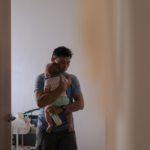What is anxiety?
Anxiety is an emotional response to a situation that someone finds challenging. It causes feelings of worry, fear, uneasiness, and physical responses like a racing heart, sweating, and tension.
Anxiety can be helpful, by alerting someone that they may be unsafe, and helping them prepare to face challenging situations.
People who have trouble understanding their thoughts, beliefs and expectations can develop excessive anxiety.
If anxious feelings and symptoms are severe, or occur often, and interfere with daily life, it may be due to an anxiety disorder like a specific phobia, social anxiety disorder or generalised anxiety disorder.
How common is anxiety?
Anxiety disorders affect nearly one in eight Australian males, but they are more common in younger than older males.
What are the symptoms of anxiety?
Anxiety is experienced as feelings of danger, powerlessness, like something bad is about to happen, an inability to concentrate, or wanting to avoid situations where these feelings might occur. When these symptoms interfere with normal everyday life, it’s likely the person has an anxiety disorder.
In addition to the emotional symptoms, there are physical symptoms experienced by people with anxiety. These include shortness of breath, trembling, pins and needles, and trouble sleeping.
What causes anxiety?
Everyone’s triggers for anxious feelings are different.
People with anxiety disorders are more likely than others to have experienced trauma (especially in childhood), to have chronic health problems, experience high levels of stress or depression, feel lonely, and use alcohol, tobacco or cannabis. These factors are not direct causes of anxiety on their own. A combination of someone’s biology, life experiences and circumstances combined is probably why they have developed an anxiety disorder.
How your partner might feel about their anxiety
Anxiety feels like losing control for lots of men. Because of the way they experience it, men might not realise that anxiety is the reason for the way they feel.
Symptoms of anxiety (e.g. fear, loss of control) can conflict with what men think is expected of them. They might feel ashamed of these kinds of feelings, which can prevent them from seeking help.

Real Story
Angus on his dependence on drinking, drugs and gambling to escape anxiety
Angus, 25, used to be like plenty of other blokes his age – spending weekends at the pub with his mates from the footy club, sinking schooners, using coke and getting on the punt. But when he recognised the habits were ruining his life, something had to give.
Read more
How you might feel about a partner’s anxiety
Couples’ relationships are affected by partners’ mental health (and vice versa). A partner’s anxiety might have a substantial impact on your day-to-day life, or you might feel overwhelmed or powerless when it comes to providing support.
How to support a partner with anxiety
Encourage them to seek help
Supporting a partner to find effective treatment from a health professional is key to removing the restrictions and frustrations of anxiety.
Acknowledge their anxiety
Acknowledging a partner’s anxiety, and accepting that their feelings are real, shows them that you understand them and do not judge them. Learning about anxiety, and talking to your partner to understand how it feels for them, can help.
Don’t try to manage their anxiety
People with anxiety disorders need treatment — either psychological therapy or medication — to help them manage their anxiety. It will ultimately be difficult for you, and unhelpful to them, if you try to manage their anxiety for them. Encourage them to seek help but don’t do it for them; it’s best if they have control over their treatment.
Look after yourself too
It’s understandable that you might make compromises to accommodate your partner’s anxiety but you should not let it rule your life. If there are activities you’d like to do, that are difficult for your partner, do them. You don’t have to include your partner in everything (or be included in everything they do). Doing things for yourself will help you build strength to help them when they need it.













